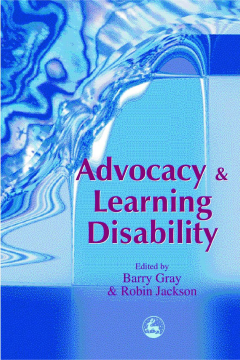
Additional Information
Book Details
Abstract
This book makes a critical case for advocacy in the lives of people with learning difficulties. This can only be applauded.'
- Disability & Society
'I found this book to be a thoughtful, interesting and challenging read and I would recommend it to anyone working in the field of advocacy or involved in any capacity with people with learning disabilities. It raises many questions about advocacy in all its different forms and asks those of us involved in this field to reflect on our own practice and that of our funding bodies. It also challenges and invites reflection on prevailing attitudes towards learning disability more generally and the way in which services are provided. Finally it leaves the reader in no doubt of the benefit and necessity of advocacy services, to ensure that people with learning disabilities are able to have their voices heard and their needs understood and met.'
-The British Journal of Developmental Disabilities
'This is designed for advocacy practitioners and staff working in agencies who come into contact with advocacy services. It is aimed at more experienced practitioners, and service planners, who are serious about developing effective advocacy services within a social inclusion framework.'
- Care and Health magazine
'This book continues to raise questions about advocacy throughout. It asks questions of those who are advocates and those who have the duty of funding such services. It is a very thoughtful and practical collection of essays on a whole range of issues and ranges, and seeks to provide, some answers. In addition to all this, it is very readable and provides a quite comprehensive bibliography, which in itself is worth the cost of the book.'
- Rostrum
'Advocacy and Learning Disability is a sound collection of perspectives with an interesting international flavour. Barry Gray and Robin Jackson have collected insightful contributions from Britain, the USA, New Zealand and Australia to create a useful overview exploring a very wide range of self-advocacy issues directly related to learning disability delivery.'
-The British Journal of Special Education
Advocacy is a critically important element in the development of effective services for people with a learning disability. It is seen by many as the critical link between theory and practice in creating a truly inclusive society. This book presents an in-depth examination of the historical, legal and philosophical contexts within which advocacy services have developed. The kind of professional and practical issues and problems confronting those running and using advocacy services are discussed, and the role of advocacy is examined. Chapters covering advocacy with families and with people with communication difficulties contain helpful information for practitioners. A survey of the development of advocacy services in the USA, Australia and New Zealand provides an international perspective.
Practical and informative, Advocacy and Learning Disability will be essential reading for advocacy practitioners and those working in agencies in the statutory and voluntary sectors who come into contact with advocacy services.
Barry Gray has worked in services for people with learning disabilities in both the UK and USA. He has, for the past twenty-two years, worked in higher education as a researcher and lecturer and has been an advocate for people with learning difficulties. Robin Jackson has worked in the field of learning disability for the past thirty years as a researcher, headteacher, lecturer and advocate. He is currently the Development and Training Co-ordinator for Camphill Scotland.
Table of Contents
| Section Title | Page | Action | Price |
|---|---|---|---|
| Advocacy and Learning Disability | 3 | ||
| Contents | 5 | ||
| 1 Introduction: Advocacy and Learning Disability | 7 | ||
| 2 Principles and Types of Advocacy | 24 | ||
| 3 Integrity and Advocacy | 38 | ||
| 4 Exploring the Role Of Values in the Management Of Advocacy Schemes | 50 | ||
| 5 Professional Consciousness and Conflict in Advocacy | 72 | ||
| 6 The Legal Context Of the Advocacy Service | 89 | ||
| 7 Thoughts From a UK Citizen Advocacy Scheme | 104 | ||
| 8 Self-Advocacy and Research | 120 | ||
| 9 The Role Of Self-Advocacy: Stories From a Self-Advocacy Group Through the Experiences Of its Members | 137 | ||
| 10 The Neglected Dimension: Advocacy and the families of children with learning difficulties | 152 | ||
| 11 Advocacy with People with Communication Difficulties | 170 | ||
| 12 Some Observations on the American Advocacy Scene | 189 | ||
| 13 Better and Worse: Overview Of Formal Advocacy for People with Intellectual Disabilities in Australia | 206 | ||
| 14 Advocacy: The Last Frontier in Special Education? | 224 | ||
| The Contributors | 243 | ||
| Index | 244 |
